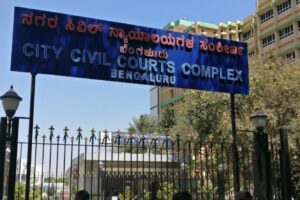Court of XX Addl. Chief Metropolitan Magistrate, Bengaluru City: Bhola Pandit, XX Addl. CMM, convicted a person who presented a cheque to repay a loan but the same was dishonored due to insufficient funds.
Instant complaint was filed under Section 200 of Code of Criminal procedure against the accused of the dishonour of cheque punishable under Section 138 of the Negotiable Instruments Act.
Background
It was alleged that the complainant and accused were very well known to each other for more than 10 years. The accused had availed a hand loan of Rs 15,00,000 from the complainant for business and family maintenance by way of cash and agreed to repay the same within one year.
Even after completion of the said period, the accused did not return the money as agreed upon. Accused had requested to wait another one year time for repayment of the said loan saying difficulty of business due to effect of demonetization of currency notes by the central government. After the lapse of agreeing another one time also, accused did not come forward to pay the said loan amount.
After several demands and requests, towards discharge of his liability, the accused had issued a post-dated cheque. The said cheque was returned by the bank due to “funds insufficient”.
The notice sent to the first address was duly served and the second-mentioned address was evaded by the accused, hence returned with an endorsement “Un Claimed”.
The complaint was filed within time and had sought to convict the accused by granting compensation under Section 357 of Code of Criminal Procedure double of the cheque amount.
Points for Consideration
- Whether the complainant proves that, accused has issued a postdated cheque for Rs 15,00,000 towards discharge of his liability, which was returned unpaid on presentation and also not complied with the notice issued by the complainant and thereby committed an offence punishable under Section 138 of NI Act?
- What Order?
Analysis, Law and Decision
Court noted that inspite of service of demand notice, accused had issued an untenable reply to the said statutory notice.
To bring home the guilt of the accused, as per the verdicts of the Supreme Court in the case of Indian Bank Assn. v. Union of India, the sworn statement of the complainant had been recorded by way of examination-in-chief as PW 1.
Further, to disprove the case of the complainant and also to rebut the statutory presumptions under Section 139 of NI Act, the accused neither had entered the witness box nor had produced documentary evidence.
As per Section 118(a) and 139 of NI Act, it was very clear that, when the issuance of cheque drawn from the account of the drawer and also a signature on the cheque was admitted or undisputed, the statutory presumptions shall be drawn in favour of the complainant stating that, the accused had issued the disputed cheque towards the discharge of his legal debt and that the complainant was the due holder of the said cheque.
In the Supreme court decision of Rangappa v. Mohan, (2010) 11 SCC 441, it was held that,
“Once the cheque relates to the account of the accused and he accepts the same and also admits his signature on the cheque, then the initial presumption under Section 139 of NI Act as well as under section 118 of NI Act has to be raised in favour of the complainant. It is a mandatory presumption. But the accused is entitle to rebut the same on preponderance of probabilities.”
Whether the present complaint would meet the mandatory provisions of section 138 of NI Act or not?
On perusal of the material documents and presentation of the complaint, it appeared that the present complaint was filed by complying with the provisions of Section 138(a) to (c) of NI Act.
The Bench added that the accused had been admitting his issuance of cheque and the signature therein. Therefore, the statutory presumptions under Sections 118(a) and 139 of the NI Act were raised in favour of the complainant. Hence, now the burden was on the accused to rebut the statutory presumptions and also to establish his defense.
Accused ha utterly failed to bring on record any probable evidence to rebut the statutory presumptions under Sections 118(a) & 139 of NI Act.
Court opined that the accused had borrowed a hand loan of Rs 15,00,000 from him and towards the discharge of the said loan, the accused issued the cheque, and the said cheque was returned unpaid due to “Funds Insufficient” in the account of the accused.
Concluding the decision, it was held that the complainant had proved the guilt of the accused punishable under Section 138 of NI Act. [Ravi M.C. v. S.S Tools, CC No. 3906 of 2019, decided on 3-12-2021]
Advocates before the Court:
For the Complainant:
Sri. Ramesh C.H., Advocate
For the Accused:
Sro. N. Somashekar, Advocate

